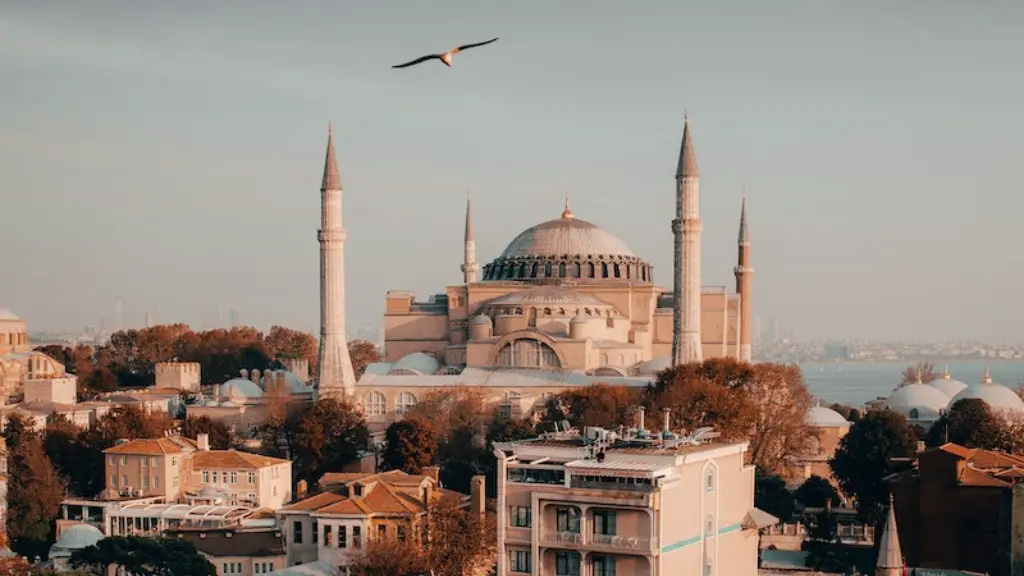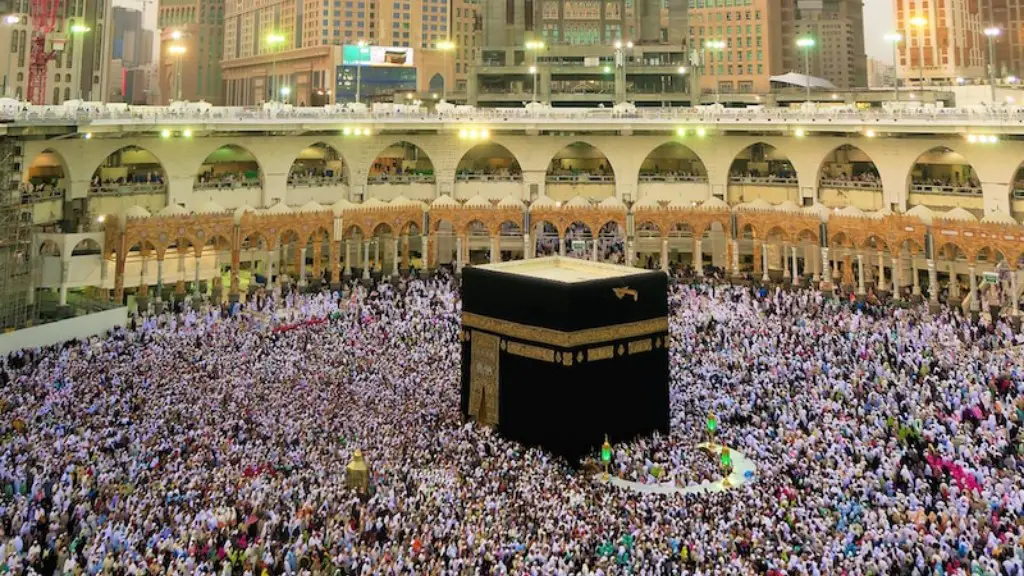Manu is an important figure in Hindu mythology who plays a key role in the ideas of Dharma and creation – he is one of the primordial beings responsible for all existence. Manu is often described as the father of the human race and plays a role in many of the central creation stories of Hinduism. Manu is also thought to be the founder of the first human dynasty, who are the progenitors of all other humans on earth. Manu is a figure of great importance and he has been referenced in numerous Hindu scriptures, from the Rigveda to the Mahabharata.
The name Manu is derived from the Sanskrit word for ‘man’ (manu) which literally means ‘thinking’. The first of the Manus is said to be Svayambhuva Manu and it is believed that all existing humans have descended from him. According to the Hindu creation myth, Manu was the first human. He was created by the great god Brahma, who created the universe and the elements necessary to sustain life. Manu is known as the perfect man, and he is described as having a perfect body and mind. He was said to be the ideal king and perfect leader who demonstrated complete control over his own body and mind.
Manu, being the perfect human, was gifted with several divine powers, including the ability to create life. He used these powers to create the first other human beings, giving them life and direction in the universe. He is said to have taught the human race essential moral, ethical, and spiritual teachings. Manu also acted as a lawmaker who formulated laws and set down social rules to live by. He is credited with writing down the first legal code of law (Manusmriti), and his teachings and laws still continue to have an influence on Hindu society today.
Manu is venerated both as a deity and an ancestor in Hinduism, being honored with temple worship and offerings of food and flowers. He is considered to be an embodiment of dharma and purity, and those who worship Manu strive to live a life of truth and righteousness. Manu is seen as a protector of the family and society, and Hindus believe that through his teachings, they can create their best lives.
The concept of Manu is deeply entrenched in Hindu mythology and is associated with the idea of cosmic order. Hindus believe that if Manu is followed and his teachings practiced, then society and individuals can achieve harmony, justice, and bliss. By adhering to the laws of Manu, Hindus believe that they can be liberated from a life of suffering and feel harmony with the divine.
Myths Surrounding Manu
There are various myths associated with Manu. According to one story, Manu was originally a hermit named Satyavrata who was dedicated to austerities and spiritual practice. His tapas (austere meditations) pleased the gods, who then asked him to create life on earth. Manu agreed and set off to perform the task of creating life, but he gave up part way through the process. The gods were angry at him for his lack of commitment, so they cursed him and turned him into a fish. Manu was then swallowed by a giant fish, and he spent many years inside the body of the giant fish, until the gods eventually rescued him and allowed him to complete his task.
In some versions of the story, Manu was rescued by Vishnu in the form of a fish, who came to Manu in a moment of crisis. Vishnu incarnated as a fish in order to save Manu and allowed him to resume the act of creation responsible for the universe and the human race. This story is often seen as a reminder that the divine love of the gods is with us even in our moments of despair and suffering.
Another popular story tells of how Manu was rescued as a baby from a great flood. He was placed in a boat, which then floated to the mountains of the Himalayas. When Manu emerged from the mountains, he was an adult, and he was then taken to the heavens to reside at Brahma’s side. In this story, the boat symbolizes the safety of dharma, which Manu is said to embody.
Manu has also been seen as a symbolic representation of a teacher in Hinduism. He is responsible for the creation and maintenance of laws and ethics within a society, and Hindus believe that by following the teachings of Manu, one can experience harmony, justice, and bliss. By adhering to the laws of Manu, Hindus believe they can stay within the boundaries of cosmic order, or Dharma.
Manu and Dharma
The concept of Dharma in Hinduism is closely tied to the figure of Manu. Dharma is a concept which refers to cosmic order and morality, and is seen as the path to liberation and justice for Hindus. Dharma is concerned with doing what is right or necessary, and obeying the ethical and ritual laws that govern Hindu society. Manu is seen as the embodiment of Dharma, and his teachings are used as guidance or example for Hindus to follow. Through adherence to Dharma, Hindus believe that they can create a life of harmony, justice, and bliss.
The Vedas are a sacred collection of ancient Hindu scriptures which reference the figure of Manu. They explain how Manu established cosmic order through his teachings. These teachings outline the laws of both cosmic and human order, which are then used as an ethical code in Hinduism. The Vedas explain that Manu created the four varnas, or Varna Dharma, which is an idea of social divisions based on inherited occupation. This Varna Dharma is still observed by many Hindus in present day, and is seen as the ideal way to create harmony and justice in society, as outlined by Manu.
Manu is also revered in Jainism, which is a religion that developed in India in the sixteenth century BCE. The Jains consider Manu as the first and most important of the twenty-four Tirthankaras, or enlightened humans, who epitomize spiritual perfection. They believe that Manu was one of the earliest humans to gain enlightenment, and Jains venerate him as an example of how to strive for inner liberation and enlightenment.
Manu’s Legacy
Manu has had a great legacy, and his teachings continue to be relevant today. He is venerated as a deity and an ancestor in Hinduism, and his teachings still inform many aspects of day-to-day Hindu life. Hindus also consider Manu to be a great teacher and source of wisdom, as he set down laws and rules which promote harmony in society and liberation in individuals. Manu is also revered in Jainism, and his teachings are still observed and studied by Jains today. Manu’s legacy will no doubt continue to be far-reaching, as his teachings remain relevant and important in Hindu thought.
The Impact of Manu
Manu’s figure has had a lasting impact on Hindu society and on the course of Hindu history. His teachings on Dharma were influential in shaping the traditional Hindu social structure, and his laws are still studied and observed by Hindus today. Manu is also seen as a symbol of morality, justice, and truth, as he set down rules to live by and guided humanity towards enlightenment. Manu’s impact is far-reaching, and he will continue to remain relevant in Hindu thought for many years to come.
The Perception of Manu
Manu is often seen in a different light. Some Hindus perceive Manu as a symbol of patriarchy, as his laws are seen as advocates of traditional masculine roles and duties. Others have criticized him for his elitist attitude and his prejudiced laws. Manu has also been seen as an oppressive force, as his laws limit the freedom and autonomy of certain individuals in Hindu society. It is also argued that Manu’s teachings are too rigid and inflexible for the modern day, and that his laws are oppressively outdated.
Despite these criticisms, Manu remains a key figure in Hindu theology, as many Hindus continue to use his teachings as guidance. He is still seen as a source of wisdom and morality, and his impact is still felt in Hindu society today. Manu continues to be revered as an ancestor and an embodiment of Dharma, and his laws will continue to influence Hindu life for many years to come.

